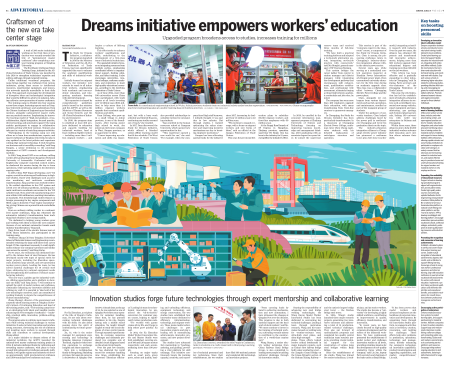Developing an innovative talent cultivation model:
Deepen cooperation between schools and industry to innovate talent training models tailored to local conditions. Create hybrid learning systems that support flexible education for industrial workers, integrating both online and offline methods. Establish mechanisms that combine moral education with technical training, and coordinate work with studies. Support various schools in enhancing higher education related to continuing studies, providing effective skills training, and encouraging programs for model workers and skilled craftsmen. Promote advanced research classes and organize innovation camps for these talented individuals.
Enhancing the development of learning facilities:
Utilize union worker service bases, industry and enterprise training centers, and open regional practice centers for industry-education integration, and school-enterprise joint continuing education or training centers for industrial workers. Establish and support in-house training facilities within enterprises, allowing capable schools and social training institutions to participate in employee education and training in an orderly manner. Build an extensive and rich learning network for industrial workers, and explore effective ways to provide inclusive and universal educational training for migrant workers and industrial workers in new employment forms.
Expanding the availability of educational resources:
Support schools in developing specialized programs aligned with regional industries and key talent needs. Create high-quality online courses and continually updated textbooks for lifelong learning among industrial workers. Utilize platforms like a national smart vocational education platform, a national smart lifelong education platform, and the "home of workers" APP to develop an intelligent skill-learning platform. Encourage universities, open universities, vocational schools, craftsman colleges, and industry enterprises to share quality teaching resources with industrial workers.
Promoting the recognition and conversion of learning achievements:
Establish a standard system to certify and convert industrial workers' learning outcomes. Enable mutual recognition of educational achievements, degrees, skill credits, and certificates to support lifelong learning. Encourage schools to recognize workers' professional experience and informal learning. Urge skill evaluation institutions to exempt certain vocational skill assessments for workers with relevant education. Implement a system linking vocational qualifications and skill levels with job titles and educational benefits, and establish mechanisms for smooth transitions between professional, managerial, and technical roles.
Encouraging active participation of enterprises:
Enhance employee education systems to protect learning rights, and support paid learning for industrial workers. Motivate companies to invest in worker education. Support large and medium-sized enterprises in establishing craftsman colleges and conducting public vocational training. Guide small and medium-sized enterprises to use learning service platforms and resources. Encourage inking workers' ongoing education to skill assessments, factoring in skill enhancement for wage increases.

